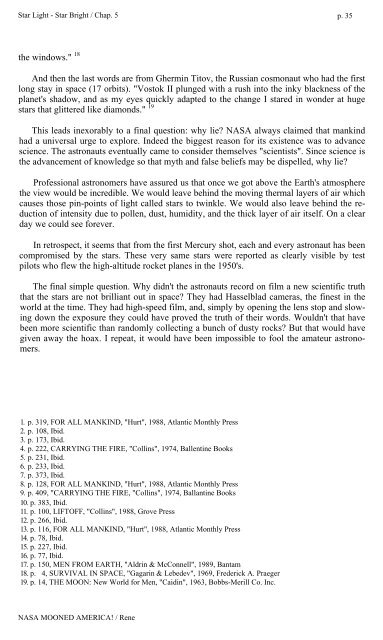Rene-NASA-Mooned-America
Rene-NASA-Mooned-America
Rene-NASA-Mooned-America
You also want an ePaper? Increase the reach of your titles
YUMPU automatically turns print PDFs into web optimized ePapers that Google loves.
Star Light - Star Bright / Chap. 5 p. 35<br />
the windows." 18<br />
And then the last words are from Ghermin Titov, the Russian cosmonaut who had the first<br />
long stay in space (17 orbits). "Vostok II plunged with a rush into the inky blackness of the<br />
planet's shadow, and as my eyes quickly adapted to the change I stared in wonder at huge<br />
stars that glittered like diamonds." 19<br />
This leads inexorably to a final question: why lie <strong>NASA</strong> always claimed that mankind<br />
had a universal urge to explore. Indeed the biggest reason for its existence was to advance<br />
science. The astronauts eventually came to consider themselves "scientists". Since science is<br />
the advancement of knowledge so that myth and false beliefs may be dispelled, why lie<br />
Professional astronomers have assured us that once we got above the Earth's atmosphere<br />
the view would be incredible. We would leave behind the moving thermal layers of air which<br />
causes those pin-points of light called stars to twinkle. We would also leave behind the reduction<br />
of intensity due to pollen, dust, humidity, and the thick layer of air itself. On a clear<br />
day we could see forever.<br />
In retrospect, it seems that from the first Mercury shot, each and every astronaut has been<br />
compromised by the stars. These very same stars were reported as clearly visible by test<br />
pilots who flew the high-altitude rocket planes in the 1950's.<br />
The final simple question. Why didn't the astronauts record on film a new scientific truth<br />
that the stars are not brilliant out in space They had Hasselblad cameras, the finest in the<br />
world at the time. They had high-speed film, and, simply by opening the lens stop and slowing<br />
down the exposure they could have proved the truth of their words. Wouldn't that have<br />
been more scientific than randomly collecting a bunch of dusty rocks But that would have<br />
given away the hoax. I repeat, it would have been impossible to fool the amateur astronomers.<br />
1. p. 319, FOR ALL MANKIND, "Hurt", 1988, Atlantic Monthly Press<br />
2. p. 108, Ibid.<br />
3. p. 173, Ibid.<br />
4. p. 222, CARRYING THE FIRE, "Collins", 1974, Ballentine Books<br />
5. p. 231, Ibid.<br />
6. p. 233, Ibid.<br />
7. p. 373, Ibid.<br />
8. p. 128, FOR ALL MANKIND, "Hurt", 1988, Atlantic Monthly Press<br />
9. p. 409, "CARRYING THE FIRE, "Collins", 1974, Ballantine Books<br />
10. p. 383, Ibid.<br />
11. p. 100, LIFTOFF, "Collins", 1988, Grove Press<br />
12. p. 266, Ibid.<br />
13. p. 116, FOR ALL MANKIND, "Hurt", 1988, Atlantic Monthly Press<br />
14. p. 78, Ibid.<br />
15. p. 227, Ibid.<br />
16. p. 77, Ibid.<br />
17. p. 150, MEN FROM EARTH, "Aldrin & McConnell", 1989, Bantam<br />
18. p. 4, SURVIVAL IN SPACE, "Gagarin & Lebedev", 1969, Frederick A. Praeger<br />
19. p. 14, THE MOON: New World for Men, "Caidin", 1963, Bobbs-Merill Co. Inc.<br />
<strong>NASA</strong> MOONED AMERICA! / <strong>Rene</strong>


